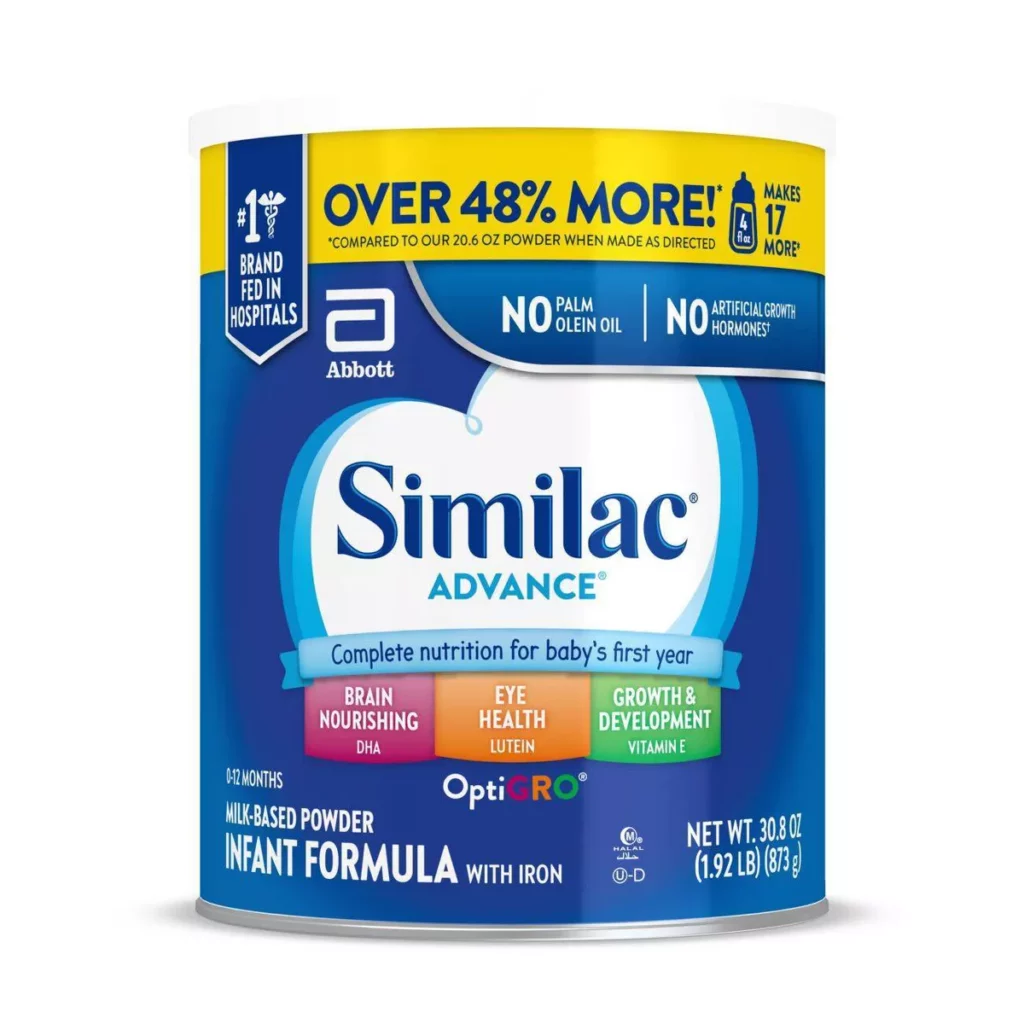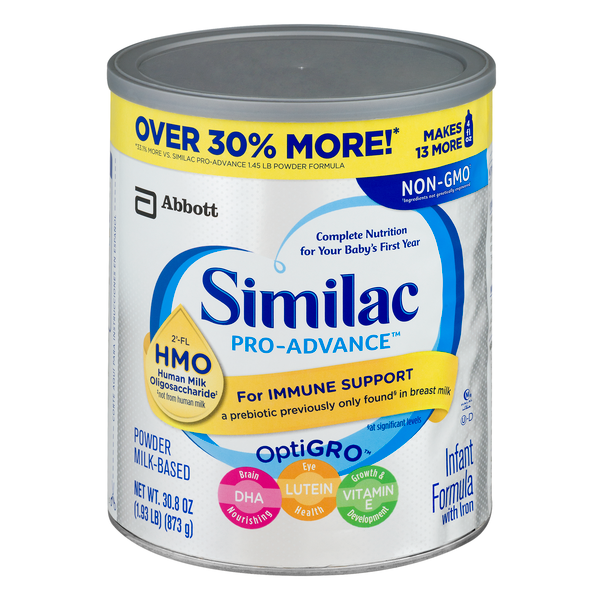Similac is a popular brand of infant formula that has been trusted by parents for years. Similac Advance and Pro Advance are two of the most popular products in the Similac range. While both formulas are designed to provide complete nutrition for babies, there are some key differences between the two.
Similac Advance is a standard infant formula that is designed to provide complete nutrition for babies from birth to 12 months. It contains a blend of proteins, carbohydrates, vitamins, and minerals that are essential for baby’s growth and development. On the other hand, Similac Pro Advance is a premium infant formula that contains added nutrients and probiotics to support baby’s immune system and digestive health.
Both formulas have their own unique benefits and cons, and it’s important for parents to understand these differences before deciding which one to use. In this article, we will take a closer look at Similac Advance vs Pro Advance, compare their key ingredients, benefits and cons, special features, and potential issues. We will also compare them with other brands, discuss their price and availability, and provide our final thoughts on which formula is the best for your baby.
Key Takeaways
- Similac Advance and Pro Advance are two popular infant formulas that provide complete nutrition for babies.
- While both formulas have similar ingredients, Pro Advance contains added nutrients and probiotics to support baby’s immune system and digestive health.
- It’s important for parents to consider the benefits and cons of each formula before deciding which one to use for their baby.
Overview of Similac Advance and Pro Advance
Similac is a well-known formula brand that produces various infant formulas to meet the nutritional needs of babies. Two of their popular formulas are Similac Advance and Pro Advance.
Similac Advance is a milk-based formula that is suitable for infants from birth to 12 months. It contains a blend of DHA, lutein, and vitamin E that supports brain and eye development. Additionally, it has OptiGRO, a unique blend of nutrients that supports the immune system, brain development, and overall growth.
On the other hand, Similac Pro Advance is also a milk-based formula that is suitable for infants from birth to 12 months. It contains 2′-FL HMO, a prebiotic that supports the immune system and promotes healthy gut bacteria. It also has OptiGRO, just like Similac Advance, which supports brain and eye development.
Both formulas are designed to provide complete nutrition for infants and meet the nutritional standards set by the FDA. They are also easy to digest and free from artificial flavors, sweeteners, and colors.
In summary, Similac Advance and Pro Advance are two popular infant formulas from Similac that provide complete nutrition for babies. While Similac Advance contains DHA, lutein, and vitamin E, Similac Pro Advance contains 2′-FL HMO, a prebiotic that supports the immune system. Both formulas are easy to digest and free from artificial flavors, sweeteners, and colors.
Key Ingredients

Nutritional Value
Similac Advance and Pro Advance are both infant formulas that are designed to provide complete nutrition for babies. Both formulas contain a blend of protein, fat, carbohydrates, vitamins, and minerals that are essential for healthy growth and development.
Protein is an important component of both formulas, as it helps to build and repair tissues in the body. Similac Advance contains nonfat milk and whey protein concentrate, while Pro Advance contains nonfat milk and whey protein concentrate as well as M. alpina oil. Both formulas contain 2.1 grams of protein per 100 calories.
Fat is also an important component of infant formula, as it provides energy and helps to support brain development. Similac Advance contains a blend of high oleic safflower oil, soy oil, and coconut oil, while Pro Advance contains a blend of high oleic safflower oil, soy oil, and M. alpina oil. Both formulas contain 5.6 grams of fat per 100 calories.
DHA is an omega-3 fatty acid that is important for brain and eye development. Both Similac Advance and Pro Advance contain DHA, with Pro Advance containing slightly more per serving.
Unique Ingredients
Similac Pro Advance contains a unique blend of ingredients that are not found in Similac Advance. These include Lutein, an antioxidant that supports eye health, as well as Nucleotides, which support the immune system.
Similac Advance, on the other hand, contains Iron, Calcium, and Vitamin E, which are important for healthy growth and development. It also contains a blend of other vitamins and minerals, including Vitamin A, Riboflavin, Choline, Taurine, Inositol, Zinc, and Beta-Carotene.
Both formulas contain lactose as a source of carbohydrates, which is easy for babies to digest. They also contain Vitamin D, which helps the body absorb calcium and supports bone health.
Benefits and Cons
Pros of Similac Advance

Similac Advance is a popular infant formula that provides complete nutrition for babies. Here are some of the benefits of using Similac Advance:
- Brain development: Similac Advance contains DHA, an omega-3 fatty acid that supports brain development.
- Eye development: Similac Advance also contains lutein and vitamin E, which help support eye development.
- Gut health: Similac Advance contains prebiotics that promote good gut health.
- Complete nutrition: Similac Advance provides all the necessary nutrients that babies need for healthy growth and development.
Cons of Similac Advance
While Similac Advance has many benefits, there are also some potential downsides to using this formula:
- Cost: Similac Advance is more expensive than some other infant formula brands.
- Allergies: Some babies may be allergic to the ingredients in Similac Advance, such as milk or soy.
Pros of Similac Pro Advance

Similac Pro Advance is a newer version of Similac Advance that offers some additional benefits:
- Memory: Similac Pro Advance contains a unique blend of nutrients called OptiGRO, which includes DHA, lutein, and vitamin E. This blend has been shown to support memory and learning in infants.
- Vision: The OptiGRO blend in Similac Pro Advance also supports vision development.
Cons of Similac Pro Advance
While Similac Pro Advance has some advantages over Similac Advance, there are also some potential downsides:
- Cost: Like Similac Advance, Similac Pro Advance is more expensive than some other infant formula brands.
- Allergies: Some babies may be allergic to the ingredients in Similac Pro Advance, such as milk or soy.
Overall, both Similac Advance and Similac Pro Advance provide complete nutrition for babies and support healthy growth and development. However, parents should always consult with their pediatrician to determine which formula is best for their baby.
Special Features
Similac Advance and Pro-Advance are two popular infant formulas that offer unique features to support the growth and development of babies. Here are some of the special features of these formulas:
OptiGro
Both Similac Advance and Pro-Advance contain the OptiGro blend, which is a combination of DHA, lutein, and vitamin E. These nutrients are essential for brain and eye development in infants. The OptiGro blend is designed to support the growth and development of babies during their first year of life.
HMO Prebiotic
Similac Pro-Advance contains an added ingredient called 2′-FL HMO, which is a prebiotic that supports the development of a healthy gut microbiome in infants. HMOs are complex sugars that are naturally found in breast milk and are thought to play a role in immune system development. The addition of 2′-FL HMO to Similac Pro-Advance helps to support the immune system and digestive health of infants.
Non-GMO Ingredients
Both Similac Advance and Pro-Advance contain non-GMO ingredients. This means that the ingredients used in these formulas have not been genetically modified. Non-GMO ingredients are becoming increasingly popular among parents who want to provide their babies with formulas that are as natural as possible.
In summary, Similac Advance and Pro-Advance offer unique features to support the growth and development of infants. Both formulas contain the OptiGro blend, which is essential for brain and eye development. Similac Pro-Advance also contains 2′-FL HMO, which supports the development of a healthy gut microbiome and the immune system. Additionally, both formulas contain non-GMO ingredients, which are becoming increasingly popular among parents who want to provide their babies with natural formulas.
Potential Issues
Similac Advance and Pro Advance are both popular infant formulas that are designed to provide complete nutrition for infants. However, some babies may experience potential issues when consuming these formulas. Here are some common issues that parents may encounter:

Allergies and Sensitivities
Some infants may have allergies or sensitivities to certain ingredients in infant formulas, including cow’s milk protein, soy protein, or lactose. Similac Advance and Pro Advance both contain milk and soy ingredients, so parents should be aware of the potential for allergic reactions or sensitivities.
If a baby has an allergy or sensitivity, parents may notice symptoms such as hives, rashes, vomiting, diarrhea, or difficulty breathing. If these symptoms occur, parents should consult with their pediatrician and consider switching to a different formula that is better suited for their baby’s needs.
Digestive Concerns
Another potential issue that parents may encounter with Similac Advance and Pro Advance is digestive concerns. Some infants may experience gas, fussiness, colic, or reflux when consuming these formulas.
Parents can try different techniques to help alleviate these symptoms, such as burping the baby more frequently, holding the baby in an upright position during feedings, or using anti-colic bottles. Additionally, Similac offers a range of specialized formulas that are designed to address specific digestive concerns, such as Similac Sensitive for lactose intolerance or Similac Total Comfort for fussiness and gas.
In conclusion, while Similac Advance and Pro Advance are both high-quality infant formulas that provide complete nutrition for infants, some babies may experience potential issues when consuming these formulas. Parents should be aware of the potential for allergies, sensitivities, and digestive concerns and consult with their pediatrician if they have any concerns or questions.
Comparison with Other Brands
Similac Advance and Pro-Advance are two of the most popular infant formula brands on the market. However, there are other brands that parents may consider when choosing a formula for their baby. Here is a comparison of Similac Advance and Pro-Advance with two other popular brands: Enfamil and Alimentum.
Enfamil
Enfamil is another popular brand of infant formula. Like Similac, Enfamil offers a range of formulas to meet the nutritional needs of babies at different stages of development. Enfamil also offers formulas that are designed to address specific issues, such as fussiness, gas, and spit-up.
When comparing Similac Advance and Pro-Advance with Enfamil, there are a few key differences to consider. First, Enfamil uses a blend of two prebiotics, while Similac uses just one. Second, Enfamil has higher levels of DHA and ARA, which are important for brain and eye development. Finally, Enfamil’s formulas tend to be slightly more expensive than Similac’s.
Alimentum
Alimentum is a specialized formula designed for babies with allergies or sensitivities to cow’s milk. Unlike Similac and Enfamil, Alimentum is made from hydrolyzed protein, which is easier for babies to digest. Alimentum also contains no lactose, which can be a problem for babies with lactose intolerance.
When comparing Similac Advance and Pro-Advance with Alimentum, it’s important to note that they are designed for different purposes. While Similac and Enfamil are general-purpose formulas, Alimentum is specifically designed for babies with allergies or sensitivities. If your baby has a milk allergy or intolerance, Alimentum may be a good choice, but if not, Similac or Enfamil may be a better option.
In conclusion, when choosing an infant formula, it’s important to consider your baby’s individual needs and preferences. Similac Advance and Pro-Advance are both high-quality formulas that provide the nutrition babies need to grow and thrive. However, there are other brands on the market that may be a better fit for some babies. Parents should consult with their pediatrician to determine the best formula for their baby.
Price and Availability

When it comes to choosing between Similac Advance and Pro Advance, price is an important factor to consider. Both formulas are available in a variety of formats, including powder, ready-to-feed, and concentrate. However, the price of each format can vary significantly.
Powdered Similac Advance and Pro Advance are both relatively affordable options, with a similar price point. However, ready-to-feed formulas tend to be more expensive, and this is no exception with Similac. Similac Advance Ready-to-Feed is generally more expensive than Pro Advance Ready-to-Feed.
In terms of availability, both Similac Advance and Pro Advance are widely available at most major retailers, including grocery stores, pharmacies, and online retailers. However, it is worth noting that the ready-to-feed format may not be available at all locations, and may be more difficult to find in some areas.
Overall, while the price of Similac Advance and Pro Advance can vary depending on the format chosen, both formulas are generally fairly affordable and widely available. Those on a budget may want to consider the powdered format, while those who value convenience may prefer the ready-to-feed option despite the higher cost.
Final Thoughts
When it comes to choosing between Similac Advance and Pro Advance, there are a few things to consider. Both formulas are designed to provide complete nutrition for infants, but there are some differences to keep in mind.
For parents in the US, both Similac Advance and Pro Advance are widely available and can be found at most major retailers. However, it’s important to note that Similac Advance is the more affordable option of the two.
For parents who are breastfeeding, it’s important to consult with a pediatrician before introducing formula to their baby’s diet. While both Similac Advance and Pro Advance are designed to be gentle on a baby’s stomach, breast milk is still the best source of nutrition for infants.
In terms of recalls, both Similac Advance and Pro Advance have had recalls in the past. However, it’s important to note that these recalls were due to concerns over potential contamination and were not related to the quality or effectiveness of the formulas themselves.
Overall, when choosing between Similac Advance and Pro Advance, it’s important to consider factors such as availability, cost, and the advice of a pediatrician. By doing so, parents can make an informed decision about which formula is best for their baby’s needs.
Related posts:
- Difference Between Similac Sensitive And 360 Sensitive
- Similac Alimentum vs Nutramigen: A Comparison of Hypoallergenic Formulas
Frequently Asked Questions
What are the benefits of Similac Pro-Advance?
Similac Pro-Advance is designed to provide complete nutrition for babies. It contains a unique blend of nutrients that support brain and eye development, as well as immune support. The formula is also easy to digest and gentle on a baby’s tummy.
What is the difference between Similac Gold and Similac Advance?
Similac Gold and Similac Advance are both infant formulas designed to provide complete nutrition for babies. However, Similac Gold contains a prebiotic blend that supports digestive health, while Similac Advance does not. Additionally, Similac Gold is available in a partially hydrolyzed protein option for babies with sensitive tummies.
Is Similac Advance good for newborns?
Yes, Similac Advance is a great option for newborns. It is designed to provide complete nutrition for babies and is easy to digest. However, it is always best to consult with a pediatrician to determine the best formula for your baby’s specific needs.
What is the price of Similac Pro-Advance?
The price of Similac Pro-Advance can vary depending on the size of the container and where it is purchased. Generally, a 23.2 oz container can range from $25 to $30.
Can Similac Advance and Pro-Advance be mixed?
It is not recommended to mix different types of formula unless directed by a pediatrician. Similac Advance and Pro-Advance have different nutrient profiles, so mixing them could result in an imbalanced diet for your baby.
Which is better, Similac or Similac Advance?
Similac and Similac Advance are both great options for infant formula. Similac Advance is designed to provide complete nutrition for babies, while Similac also offers specialized formulas for specific needs, such as sensitive tummies or lactose intolerance. Ultimately, the best formula for your baby will depend on their specific needs and should be determined in consultation with a pediatrician.

Iesha is a loving mother of 2 beautiful children. She’s an active parent who enjoys indoor and outdoor adventures with her family. Her mission is to share practical and realistic parenting advice to help the parenting community becoming stronger.
